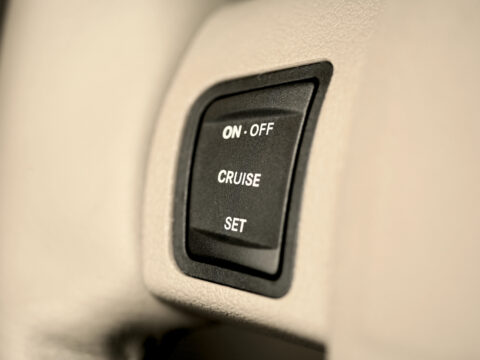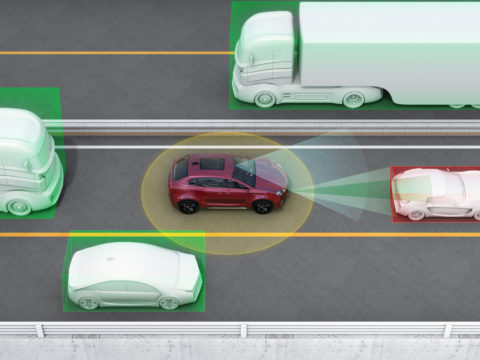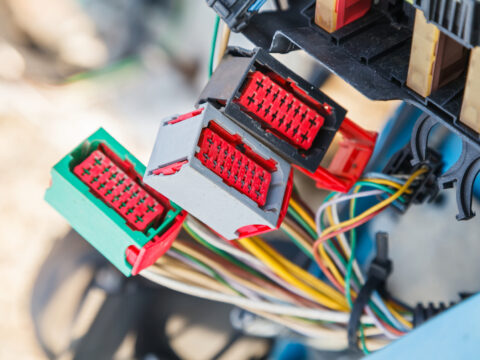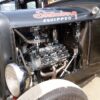The alternator is a crucial component of your car. Its primary function is to charge your engine’s battery and other electrical parts, such as the headlights and sound system. Understanding how it can malfunction and what to look for can save you a lot of time and money.
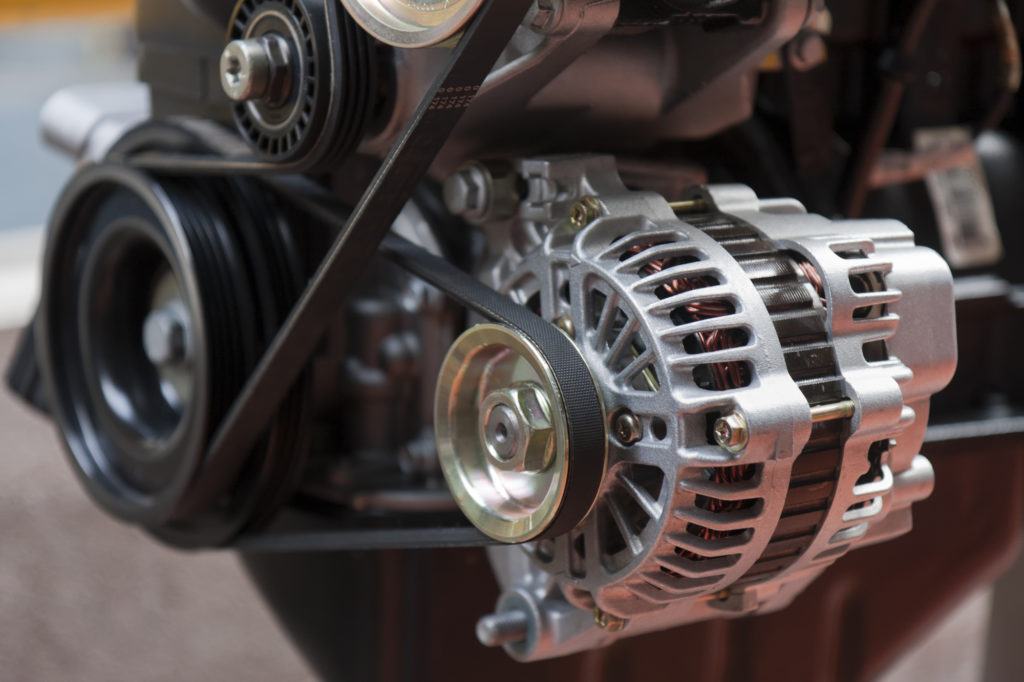
Contents
How Does an Alternator Work?
An alternator works by using a direct current (DC) to charge your battery and power several other components while you drive.
It’s connected to a pulley system and drive belt that power up when your engine turns on, turning the alternator’s rotor shaft. This action causes a series of magnets to rotate around a coil.
As the magnets rotate, they create an alternating current (AC). Your alternator’s rectifier then converts this AC energy into DC energy, generating power for the electrical systems in your car.
Main Parts of an Alternator
Several parts comprise an alternator, and each of them has a unique function. Here are the most crucial components.
Regulator
The regulator controls the voltage and manages how much power the alternator channels to the battery.
Rotor
The alternator’s rotor spins around to make the drives belt and pulley rotate, making the magnets rotate.
Rectifier
The rectifier converts the AC energy to DC while charging happens.
Slip rings
Slip rings are electrical devices that transmit power to the rotor.
Slip Ring End Bearings
The end bearings provide the rotate shaft support while it spins.
Drive End Bearing
The drive end bearings offer additional support to the rotate shaft. These are what it spins on.
Stator
A stator is a ring made of iron with wire coils around it and is the central part of an alternator. Its function is to supply electrical energy.
Pulley
The pulley works with the drive system to allow the alternator to rotate. Depending on the type of car you have, the pulley can be grooved to complement a V-shaped belt or a serpentine belt (several newer car models have a serpentine-style belt). Its size and design ensure that your car’s engine gets the proper amount of charge at different speeds.
Why Does an Alternator Go Bad?
The lifespan of an alternator is between 100,000 and 150,000 miles (around seven years). Because they’re generally long-lasting, their age is the most common reason for alternators to go bad.
However, the number of electronic components in the car, the way you drive and maintain the vehicle, and the alternator’s quality all determine how soon an alternator will die out.
Some things that may contribute to an alternator going bad are:
- Installing electrical components that cause it to overload
- Jumpstarting the car incorrectly
- Wear and tear from leaking fluid such as engine oil
Symptoms of a Faulty Alternator
These are some red flags to look for if you suspect you have a bad alternator:
Unexpected Malfunctioning of Any Electrical Systems
If your lights suddenly start dimming or changing in brightness, this could be a problem with your alternator. Additionally, any other electrical components that begin to fail, including the radio or air conditioner, could also indicate your alternator is having issues.
Seeing “ALT” or “GEN” Pop up on the Dashboard
When you see a warning light that spells ALT or GEN, it means that your battery is not receiving enough charging power. This is one of the most obvious signs of needing a new alternator.
A Stalling Engine
A car that stalls at seemingly random times typically has a bad alternator. That’s because if your battery isn’t getting charged, it will cause your fuel injectors to fail. You may deal with your engine stalling off and on as a result.
A Drained Battery
If you notice that your car isn’t starting, it’s likely due to a dead battery. Sometimes, there is a good reason for your battery to die, such as forgetting to turn off the lights in the car.
In these cases, your first course of action will likely be to jumpstart the car and fix the problem. Constantly having to jumpstart your car can indicate a problem with the battery itself.
How to Test an Alternator (DIY)
You can use a multimeter to check your alternator. Start by setting your multimeter to DCV (DC Volts) and a number higher than 15. Place the black cable from your multimeter in the negative terminal. Then, place the red cable in the positive terminal.
Next, check the reading. You want a number close to 12.6. After starting the car, try to get a reading between 14.2 and 14.7.
If your reading is higher or lower than this range, it means your battery is either overcharged or undercharged. You can also check all the electrical components separately and see if your reading falls below 13 (it shouldn’t).
After turning your car back off, you should see a reading of bear 12.6 again.
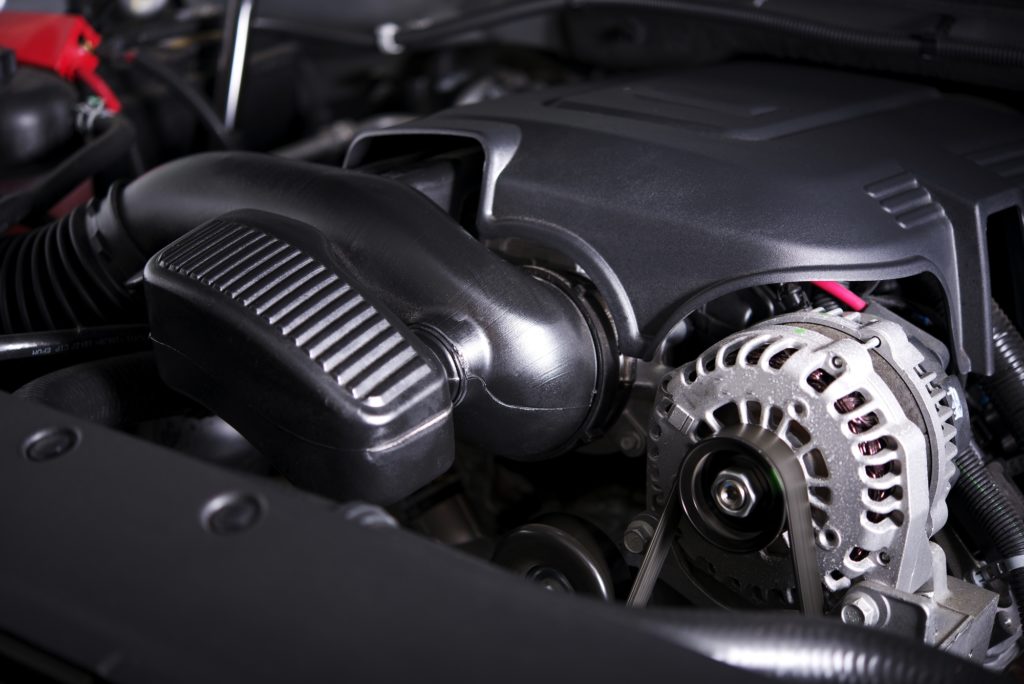
What Causes an Alternator to Malfunction?
The most common reason for an alternator to malfunction is age. That said, sometimes an alternator can malfunction much sooner than expected for other reasons.
A Slipped Belt
If the alternator’s belt is somehow damaged, it can slip off and cause the alternator to produce less voltage. It’s common to hear a sharp screechy sound when this happens, but the sound can also be very faint.
A Bad Duse
When a fuse is blown, the alternator cannot charge the battery. A fuse can go out because of a short circuit or too much current flow.
Computer Issue
New car models often have a computer system that manages the alternator and other electrical components. A system issue could cause the alternator to malfunction despite there being nothing wrong with the alternator’s parts.
Diodes
A common reason for an alternator malfunctioning is a bad diode or diodes. Diodes assist in converting AC power to DC power in your alternator’s rectifier. A diode can get burnt out due to overheating or overloading.
Leaking Fluid
Power-steering fluid or engine oil can sometimes leak its way to the alternator and cause it to malfunction. Leaking oil or fluid typically means something is damaged, worn, or fitting incorrectly. Damaged seals or O rings, for example, can lead to fluid leaking.
How to Fix a Bad Alternator Diode
The good news is that diodes can be repaired. Most alternators have six diodes. If one or more of them has stopped working, you can replace the rectifier’s assembly.
How Much Will It Cost to Fix It?
The cost of a new alternator, including labor, is between $500 and $1,000. Smaller parts of the alternator, such as a belt that became loose, will only cost about $150.
How Often Does a Car Alternator Need to Be Replaced?
How much you drive and how well your car is maintained will impact the lifespan of your alternator. Typically, you want to replace it every 100,000 miles and wait no longer than 150,000.
Alternator FAQs
Here are some of the most commonly asked questions about alternators.
Can a bad alternator cause limp mode?
If your alternator’s voltage regulator stops working, it can result in your car going into limp mode.
Is it worth replacing an alternator?
Buying a new alternator is a sound investment. Though you can replace individual parts like a belt, you may see other issues depending on the problem. If one part is too worn from age, it’s best to replace the whole alternator.
Does an alternator work when the car is off?
The alternator works both when the car is idling and when it’s driving. However, it is not working while the car is off.
How can you tell if it’s the battery or the alternator?
If your car starts but continuously needs to be jumpstarted or runs only in small spurts, you’ve got a bad battery. A problem with the alternator will not be fixed by jumpstarting because the battery isn’t charged at all.
What causes an alternator to go bad repeatedly?
If your alternator keeps failing, it can be due to different parts being worn. If one part is too worn, you can assume the rest will follow suit.
Dirt and debris, as well as leaks, can also lead to alternators failing repeatedly. Alternatively, there could be a problem with the car’s computer.

